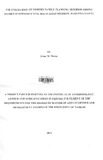| dc.description.abstract | The Kenyan government has put in place strategies and policies to reduce fertility, increase contraceptive prevalence rate and reduce the unmet family planning needs (republic of Kenya, 2007b; Ian et al, 2009).Despite these policies, total fertility rates remains high at 4.6%, while CPR for all methods is at 46% while the unmet need for family planning services averages at 24% (KNBS ICF Macro, 2010). Therefore, the main objective of this study was to assess the factors influencing the utilization of family planning services by women of reproductive age in Kisau Division, Makueni County. In specific terms, the study intended to examine women's knowledge levels of family planning methods, to analyze the factors contributing to the utilization of family planning methods and examine constraints in the use of family planning methods among women in Kisau Division. The study used purposive and convenient sampling. The study used in-depth individual interviews and key informant interviews to collect data.
Data was analysed based on the three thematic areas i.e. knowledge on family planning methods, factors and constraints affecting their utilization. The findings of the study indicate that that a majority of women under the study had knowledge of one more method of family planning at the same time, the level of use of family planning methods is average. Moreover, there was a relationship between levels of education; distance from health facilities, household's level of income and family planning methods knowledge levels and women's use/non-use of family planning methods. Fear of side effects based on information from friends, myths and misconceptions about contraceptives is another factor that influences for non-use of contraceptives. Lack of information on contraceptives, long distances to the service provision sites and the cost of contraceptives were also cited as reasons for non-use. In view of the findings, the study suggests that the government should provide contraceptives in smaller private clinics that are close to people. The government should also ensure provision of accurate information on family planning methods to help women make informed choices and reduce the cost of family planning services especially LAPMS which are costly. | en_US |

